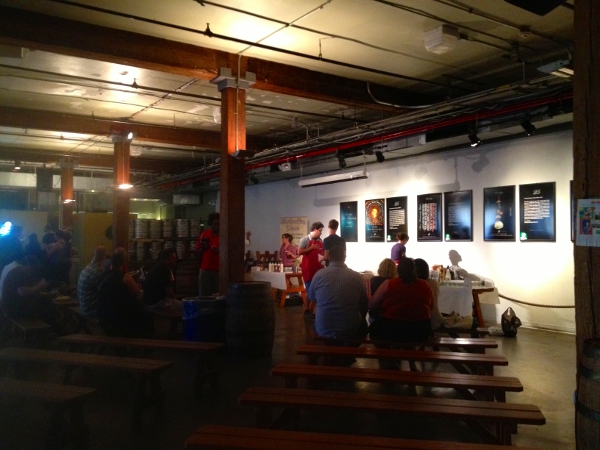[FIPS Was There...] How to BBQ at Brooklyn Brewery
 parowpyro |
parowpyro |  Friday, July 26, 2013 at 12:00PM
Friday, July 26, 2013 at 12:00PM 
'Tis the SUMMA, people. Get down with your bad selves. 'Tis the time of beaches & vacations & backyard BBQs. Personally, I don't even own a grill but I do actually have a backyard & should probably own a grill sooner than later. In the meantime, it’s the SUMMA & when this time of year comes around, I make sure to take in as many BBQs as humanly possible. Eventually, some time in 2014, when I do get that grill, I'm going to need to be on top of my game so I can host my own BBQs. I mean, I'm not entirely off my game around a grill but my duties have always been in more of a "sous chef" vein, as it's never been my grill.
One night a few weeks back, I came across an event listing for a "How to BBQ" class at Brooklyn Brewery as part of their regular schedule of events. The hosts: Heartbreaking Dawns (a local sauce company), Delaney Barbecue (of Brisket Town fame) & Q Drinks (a soda company with their roots in Ft. Greene). Samples included. The price: $5. You can't even get a good BJ for that price these days! As such, I picked up a ticket quicklike.
On Wednesday, I headed up to the brewery for the class, settling down in the tap room with fifty or so people. The evening started with Johnny McLaughlin of Heartbreaking Dawns giving us a primer on sauces. Heartbreaking Dawn got their start back in 2008 bringing their sauces to friends' BBQs in the Hudson Valley & these days, they pump out a ton of different acclaimed & typically hot sauces.
As far as BBQ sauces go, he broke it down like this: BBQ sauces are all about the region they come from. There are essentially three types of sauces--mayo-based, mustard-based & tomato-based.
Mayo-Based: They make a mayo-based "Alabama White" sauce. It's the sort of sauce that works well for white bread sandwiches & dipping. With all BBQ sauces the magic formula is a half cup of vinegar to every cup of your base. From there, it's all about what you mix in. They feel that vibrant herbs work quite well with the mayo-based sauces.
Mustard-Based: The Carolinas are known for their mustard-based BBQ sauces, which have a tangy, heavy vinegar taste. The classic kind uses a yellow mustard but you can use, in the spirit of BBQ, whatever kind you want. You balance it out with the amount of sugar you add in & whatever citrus juices you decide to throw into the mix. Of course, mustard-based sauces go well with a Carolina staple--pulled pork--but they also work well with non-white fish.
Tomato-Based: You'll see a lot of tomato-based sauces in the Midwest. The one they showed to us was a Kansas City-style BBQ sauce. These are typically thicker, with molasses often added in to take away from the bitterness of the tomato. With these sauces, you want to simmer the ingredients a lot to bring out the flavor.
Other than that, there are a bunch of different other less common sauces, from fruit-based gastrique to remoulades to regional sauces like Baltimore tiger sauces. The way I look at it, as long as you have the right ingredients, you're well on your way to a good BBQ.

Next up was Dan Delaney from Delaney Barbecue. Dude got his start after hauling a smoker up from Texas & perfecting the art of making brisket. From there, he created a pre-order system where a shitload of people ordered up his brisket. Eventually, this led to the opening of Brisket Town on Bedford Ave in shitty Williamsburg. I would've preferred to be schooled on how to man a grill but instead, he taught us about the art of trimming & smoking a brisket. While it was cool, for me a smoker is a bit behind a grill in the list of home goods to purchase, so I had to adapt what I learned a bit.
Basically, the brisket is the front pectoral muscle of the cow & it's broken down into two parts--the flat (the lean, meaty side that you get when you eat brisket on the Jewish holidays) & the point (the fatty side). When smoking a brisket, the key is to avoid drying out the flat while still cooking the point.
To start, you want to visit a butcher & pick up a "packer brisket." Once you get it home, you should trim the brisket so that you have 1/4 inch to 1/2 inch of fat on top, also trimming off any random sections of fat that will slow down the process. You should also consider trimming any extra-thin parts that will quickly dry out during the smoking process. From there, you add your spice rub, which doesn't need to be anything complicated (he uses salt & pepper).
As far as your smoker goes, you either have a bullet smoker or a directional smoker. If you have a bullet, you'll want to place your meat fat side down to deflect the heat & prevent burning. For the directional kind, you should place the larger side closer to the heat to avoid drying out the thinner side & cook the brisket more evenly. When it comes to cooking technique, Delaney feels that "low & slow" is stupid. It often ends in overly cooked meat. He explained that he smokes the meat for four hours at 225° until a nice color develops. Then he ups the temperature to 275° to render it. After eight to nine hours from the start of the smoking process, the fat should start coming out less. He recommends upping the temperature at this point to 350° to sear the outside to trap in liquid & caramelize the whole thing. When you probe it on the lean side against the grain & it feels like "just-above-room-temperature butter" or it "wiggles like a Jello Jiggler," you’re all set. Brisket perfection or something.

Since no BBQ would be complete without rampant drunkenness, the last speaker was some dude from Q Drinks, who got their start in Ft Greene after a BBQ where the founder found himself pairing good gin with shitty tonic water and decided THERE HAS TO BE A BETTER WAY! From there, cocktail bars like Milk & Honey got word and started using their tonic water. Eventually, they moved on to sodas & I'd get into it more but the dude speaking for Q spoke in a way that featured tales of African warriors & the kola nut, British explorers & "Navy strength gin," but sounded like a bit of a shill, so I won't subject you to that.
The brief takeway was that when you're hosting a BBQ, you don't want to be wasting your time fucking around making drinks for people. Make a pitcher or two of cocktails, saving the carbonated portion of the drink for the end stage of making cocktails so the fizz doesn't go away. From there, you're golden. Obviously, you want to have light drinks because it's the SUMMA after all.
...& while i wasn't entirely enlightened on the art of grilling meat, I now have a better idea of how the meat cooks & how to whip up sauces & cocktails for my future AMAZING BBQ. You should try to be just as AMAZING in the future.
Read way more from Shawn at eatdrinksnack.com and eatdrinktaco.com.
 BBQ,
BBQ,  FIPS was there
FIPS was there 





Reader Comments